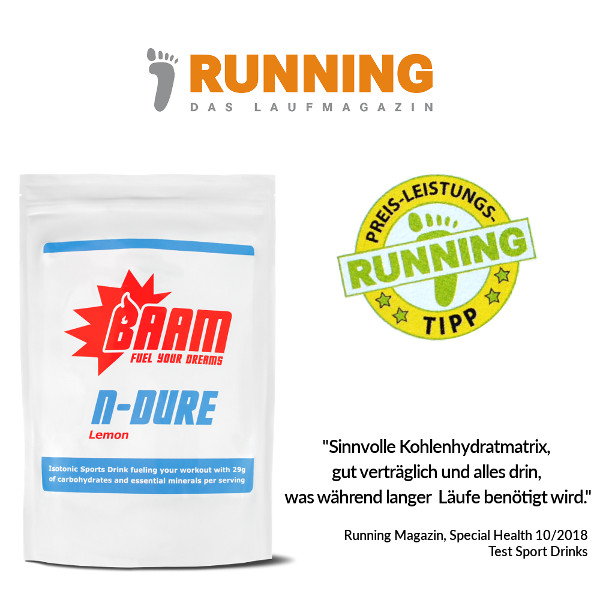Isotonic sports drinks and endurance performance
More fun in sports or how isotonic sports drinks can improve your performance
An isotonic drink is any sports drink that has an osmolarity range between 200 and 330 mOsl per liter, which is the same particulate concentration as human blood. This means, isotonic sports drinks are taken up easily by our body and they enhance the absorption of water during physical exercise. As a result, they contribute to the maintenance of endurance performance during prolonged endurance exercise.
This is super important for endurance athletes like runners, cyclists or triathletes, as dehydration and missing energy can easily ruin your day.
What are the ingredients of an isotonic drink?
Isotonic drinks are made with the aim of boosting the athlete’s performance and contain ingredients which support basic processes in the human body. Here’s what you can find in an isotonic drink:
- Between 60 and 90 grams of carbohydrates per liter which provides the athlete with energy
- Electrolytes such as sodium, magnesium, calcium or potassium that replenish the losses through sweating
- In addition, you will most often find some kind of flavouring.
How should you consume isotonic sports drinks during exercise?
During exercise you should consume up to one liter of isotonic drinks per hour of exercise. For optimum results, you drink regularly every 10-15minutes. At the same time, when using isotonic drinks, you need to be aware of your overall carbohydrate intake as your body will only be able to digest up to 60g of glucose and 30g of fructose-per hour. In case you use energy gels and/or energy bars as additional source of carbohydrates, you should count these into your total carbohydrate intake.
What carbohydrate source is best?
According to legislation, an isotonic drink must be formulated with a minimum of 75% short-chained carbohydrates such as glucose, glucose polymers and sucrose. Usually there are two options:
- Glucose-based carbohydrates with a max carbohydrate intake of around 60g per hour
- A 2:1 mix of glucose (60g) and fructose (30g) with a max carbohydrate intake of 90g per hour
From the pure numbers, it seems option two is favourable, as it provides an overall higher intake of energy. Unfortunately, fructose often leads to digestion problems such as abdominal pain, bloating, flatulence or diarrhea. For further info on this, also research fructose malabsorption or fructose intolerance. This means, a high intake of carbohydrates from fructose could lead to digestion issues and we always recommend to properly test any new sports nutrition product before usage in important events.
The BAAM isotonic sports drink N-DURE is optimized for good digestion
We consciously avoid fructose as ingredient for our isotonic sports drink N-DURE to ensure fructose-driven digestion issues are minimized. This means you can easily use two small bidons per hour to source around 60g of carboydrates per hour.

Isotonic Sports Drink N-DURE
1’000g
Lemon
Price-Performance-Winner of Running Magazine
What are the effects of isotonic sports drinks on the athlete’s performance
Your level of endurance depends on a variety of external factors you cannot control like the weather conditions or the terrain at which the physical endeavor is taking place. Internal factors that impact your stamina, can be controlled, and isotonic drinks help you do just that. In detail, they will mainly affect three areas: Dehydration prevention, water balance restauration and fueling your body during the ride.
Dehydration prevention
Several studies have proven that a dehydration of just 2% of bodyweight (just 1kg for a 50kg person) already affects the athlete’s performance negatively. According to the study conducted by the Korey Stringer Institute, dehydration causes the blood to become thicker which increases the heart rate by more than three beats per minute if the hydration level drops by just 1%. An increased heart rate affects your fatigue level and results in reduced power output.
Isotonic drinks help athletes avoid dehydration, although the frequency and quantity of the intake depend on your sweat ratio.
Water balance restoration
When minerals such as sodium or potassium are lost through perspiration, the water balance in your body can be disrupted which causes you to feel fatigued. Sodium helps especially with the transfer of water from our intestines into the bloodstream and plays an important role in maintaining the athlete’s endurance. A too low sodium level can lead to nausea, headaches and a corresponding drop in performance. In contrast to water, isotonic drinks contain electrolytes that compensate for the losses through perspiration and thus help the athlete to perform at his during prolonged exercises..
Improved energy level
Carbohydrates are another important ingredient of isotonic drinks that improves endurance during intensive training or in a race. As energy consumption increases, our body first draws on carbohydrate reserves. In order to maintain our power output over a longer period of time, we need to replenish these reserves regularly, similar to a car that needs to be refueled regularly. The body’s carbohydrate stores can provide about 1,000 to 1,500 calories. During an average bicycle ride we consume up to 600 calories per hour. Thus about 1.5 to 2 hours of riding, the body starts to reduce power if the carbohydrate reserves are not replenished. In principle, the fat metabolism can then be used to its full extent, but with correspondingly reduced performance.
In short
Isotonic sports drinks have the same particulate concentration as human blood. They can be easily absorbed by your body and help to rehydrate and replenish energy reserves. This way, they heavily support endurance performance during exercises with a duration of more than 1.5 hours.
